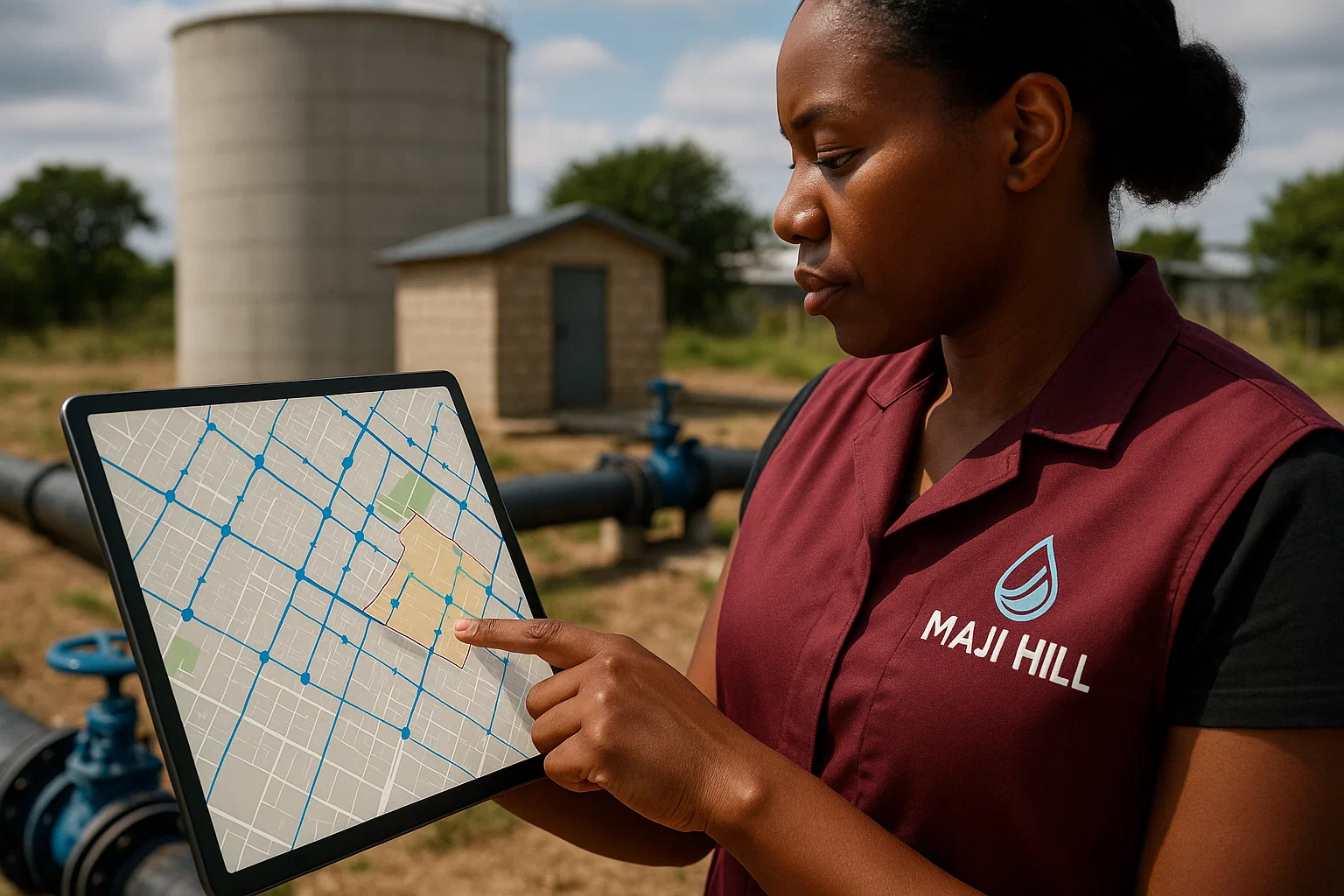
Introduction: Why Infrastructure Matters More Than You Think
Water is life—but only when it’s accessible, clean, and sustainably managed. Across Kenya and much of Africa, poor water infrastructure is quietly draining health systems, crippling economies, and deepening inequality. At Maji Hill, we don’t just solve water problems—we restore dignity, opportunity, and sustainability.
Explore our Infrastructure planning services
GIS Water Mapping & Infrastructure Planning Services
What Is Poor Water Infrastructure?
Poor water infrastructure means:
Broken or leaking pipes
No rainwater harvesting systems
Unsafe or insufficient water storage
Inadequate treatment and filtration
Limited or no plumbing in homes and schools
This isn’t just a rural issue. Urban areas in Kenya also face infrastructure decay, contamination, and scarcity.
The Economic Cost
When infrastructure fails, everyone pays:
Families spend up to 30% of income buying water
Crop failures rise due to unreliable irrigation
Constant plumbing repairs drain institutions
Businesses and households in Kenya spend millions each year on emergency water supplies, often at inflated prices.
The Public Health Impact
Poor water systems cause:
Waterborne diseases like cholera, typhoid, and dysentery
Sanitation challenges in schools and clinics
Missed school and workdays due to illness
According to WHO, unsafe water and poor sanitation are responsible for nearly 10% of global diseases.
The Human Toll: Burden on Women and Children
Without reliable water access:
Women and girls walk hours daily to collect water
Girls drop out of school
Time and labor burdens deepen gender inequality
Improving water infrastructure directly improves quality of life.
Environmental Consequences of Poor Infrastructure
Erosion from uncontrolled runoff
Contaminated rivers and groundwater
Deforestation due to digging or hauling water sources
Without sustainable systems, Kenya’s natural resources are overexploited.
Hidden Costs Most People Overlook
Reduced property values in underserved areas
Flood damage from infrastructure failure
High government spending on crisis relief rather than prevention
Each leak, broken tap, or unused rooftop is a hidden liability.
Kenya’s Current Infrastructure Crisis
45% of piped water is lost through leakage (WASREB)
Only 59% of rural Kenyans have improved water access
Nairobi’s water grid is decades old and stretched beyond capacity
The water system is under severe strain—and the need for innovation is urgent.
How Poor Infrastructure Worsens Drought and Climate Impact
Lost rainwater due to lack of harvesting
No storage to bridge dry seasons
Overdependence on costly emergency trucking
Smart infrastructure is key to drought resilience.
How Maji Hill Fixes It: Our Holistic Approach
1. Community-Centric Planning
We start with a full audit—assessing needs for homes, schools, and farms. Every system is custom-fit.
2. Smart Rainwater Harvesting
We install effective rooftop catchment systems, first-flush diverters, and UV-resistant tanks.
3. Multi-Stage Filtration & Clean Distribution
Our filtration systems meet WHO standards—gravel, carbon, and UV technologies ensure safe water for all uses.
4. Modern Plumbing & Greywater Solutions
Leak-free pipes, high-pressure pumps, and greywater reuse systems enhance efficiency and hygiene.
5. Maintenance, Monitoring, and Support
Our team offers regular service, on-call technicians, and user training to ensure long-term performance.
Real Success Stories from Kenya
Bungoma: A small farm reduced water loss and improved yield by 40%
Kajiado: A school installed a 10,000L tank and never ran out of water again
Nairobi: Apartment complex saved 65% on monthly water bills after rooftop harvesting installation
📈 ROI of Infrastructure Investment
4x return on cost through savings
20% property value increase
Lower health and repair bills
Water infrastructure isn’t an expense—it’s an investment.
Sustainable Development & Climate Resilience
Maji Hill’s work aligns with:
Kenya Vision 2030: Clean water access for all
SDG 6: Ensure availability and sustainable management of water
Kenya’s climate resilience and adaptation plans
We are building a future-proof water system, one community at a time.
Take Action: Get a Free Water Infrastructure Audit
Don’t wait for the next crisis. Let us help you turn water problems into sustainable solutions.
Book your audit today:
📍 Available across Kenya
📞 0710 573 334
📧 info@majihill.co.ke
🌐 www.majihill.co.ke
Sources & References
UN-Water: Water Scarcity
WHO: Water-Related Diseases
WASREB: Kenya Water Services Reports
Practical Action: Rainwater Harvesting in East Africa
Frequently Asked Questions (FAQs)
1. Why is poor water infrastructure such a big issue in Kenya?
Aging systems, growing population, and underinvestment make infrastructure unreliable in both rural and urban areas.
2. How fast can you install a system?
Rainwater harvesting setups can be installed in 2–5 days, depending on size and location.
3. Is rainwater safe to drink?
Yes—with proper filtration like we provide, it meets WHO safety standards.
4. How much can I save with a Maji Hill system?
Clients report up to 70% reduction in water costs plus improved health and productivity.
5. Do you offer financing or NGO partnerships?
Yes. We collaborate with organizations and offer flexible payment plans—ask us during your consultation.
